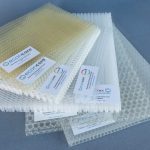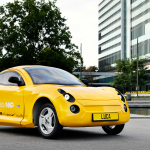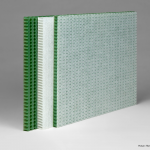Econcore’s industry honeycomb sandwich material technology
EconCore is the world leader in economic honeycomb sandwich material production technology. Their materials are often found within the automotive, transportation, furniture, packaging logistics and building construction industries. It is trusted and used by industry leading companies such as Maserati, Jaguar, Hyundai and many more.
The Belgian company provides their clients with the technology to produce light-weight panels and parts from clean material solutions containing recyclable materials of thermoplastic polymers and, amongst others, natural or glass fibres as required by the application. Despite being lightweight the honeycomb structures provide high levels of rigidity at a lower cost than their competitors.
One typical industry where EconCore’s honeycomb technology can often be found is automotive. Late last year EconCore announced a partnership involving AZL, Audi and others to develop the use of composites for electric vehicle battery housings. Their role within this project was to pre-select thermoplastic materials by using a variety of composite skin layers and testing different geometrical design variants. EconCore optimized the honeycomb material to obtain the projects desired characteristics of high rigidity and extremely lightweight when compared to competitive materials such as aluminum or steel.
Prior to this project EconCore’s innovative lightweight honeycomb technology found use within the automotive industry for vehicle trunk flooring. This technology is used for example by DPA Moldados, a Brazilian automotive supplier, to help reduce the Hyundai Creta’s trunk floor weight by 20% without compromising on rigidity. The materials are also 100% recyclable and require less energy to produce than other materials.
EconCore licensee ThermHex Waben’s lightweight polypropylene honeycomb technology is popular within the elevated roofs of Ford, Volkswagen, and other camper vans. This polypropylene honeycomb is 80% lighter than the alternative material, plywood.
This same technology is offered worldwide by EconCore and is used by Renolit, a specialist of high-quality plastic films and products, for the trunk floors of the Maserati Ghibli and Jaguar F-Type. The lightweight polypropylene honeycomb technology is also used in the trunk lid of the Toyota Prius.
The process of EconCore’s honeycomb technology begins with extruding thermoplastic polymers into a film which is then vacuum formed and folded into a honeycomb core. The next stage sees skins laminated onto the honeycomb directly as part of an in-line integrated process.
By using a continuous, in-line integrated honeycomb sandwich panel production process EconCore minimise production costs. They are also able to combine the honeycomb’s excellent mechanical properties of high rigidity with low density. This means that honeycomb technology which was once reserved for the aerospace industry due to its high production costs is now being used in a whole range of more affordable applications such as in the packaging and display industries.
EconCore technologies are available for licensing, and we will be seeking new partners at the exhibition. A growing number of EconCore’s licensees are already operating the technology within different geographies and various applications.
EconCore recently decided to invest into a new production line for RPET and high-performance thermoplastic (HPT) honeycombs. This decision was driven by an increasing demand for more sustainable materials but also an increased interest in thermoplastic materials from aerospace, railway, and automotive industries. The aim was to further develop Econcore’s existing production technology to make honeycomb materials from recycled PET waste streams and make progress in the next generation of high-performance thermoplastic honeycomb materials.
HPT honeycombs build on the pre-existing intrinsic benefits of lightweight honeycomb structures by increasing the heat stability and fire resistance, making them a suitable choice of material for applications within the aerospace, railway, and automotive industries.
The RPET honeycomb cores are made of 95% recycled post-consumer waste offering high levels of strength and stiffness in compression and shear, high temperature stability and excellent weight-to-cost ratio. The use of RPET honeycomb cores provide a sustainable solution with a good Life Cycle Assessment and low carbon footprint meeting the increasing market demand for more sustainable materials.
More than 20m² of recycled PET honeycomb cores supplied by EconCore was used by the TU/ecomotive team in the design of LUCA, a car made entirely out of recycled materials at the Eindhoven University of Technology.
EconCore are highly focused on sustainability and recently combined their patented honeycomb technology with Basaltex’s innovative use of basalt fibres to develop a new sustainable and environmentally friendly composite material. This material is developed by combining ecological fibre with RPET honeycomb and bioresin polyfurfuryl alcohol. Offering the material with enhanced fire resistance, light-weighting and sustainability makes it ideal for application within the railway industry such as train interiors.
Dr Jochen Pflug, CEO of EconCore said “Here at EconCore our industry leading honeycomb technology provides three core advantages: minimal costs, minimal weight and minimal environmental impact. Both our materials and processes combine aerospace honeycomb technology with efficient production technologies to enable cost-efficient continuous production of honeycombs by successive in-line operations.”
If you would like to learn more about EconCore’s honeycomb technologies please visit: https://EconCore.com/en/.





Deixe um comentário